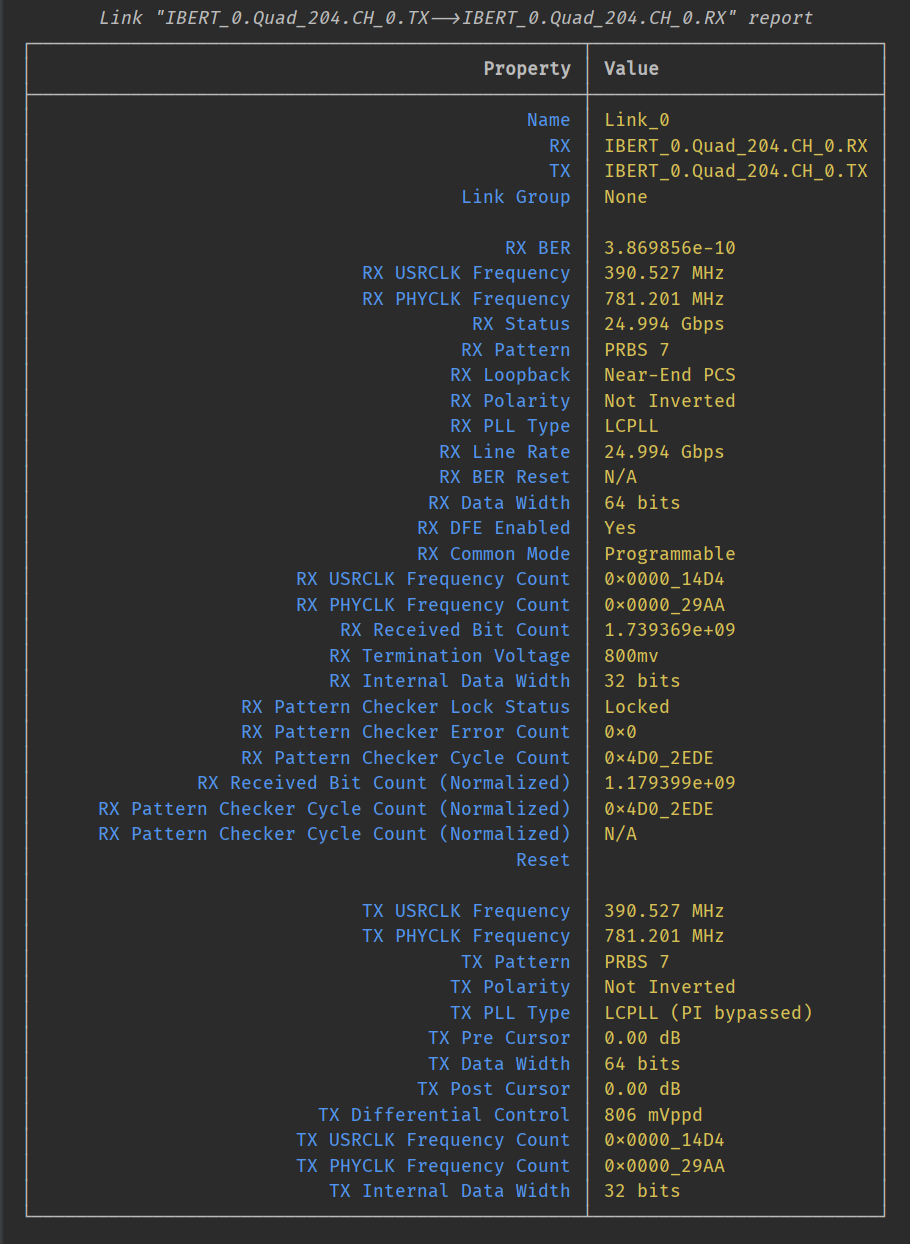Link¶
A link represents the physical connection between a TX and RX and can be used to modify the TX/RX parameters, run 2D statistical eye scans and access other metrics for judging the quality of the link.
Create links¶
Links can be created using RX and TX.
To create a link, use the factory function create_links().
Here’s an example of creating a link
"""
Other imports
"""
from chipscopy.api.ibert import create_links
"""
Boilerplate stuff - Create a session, get the IBERT core etc etc
"""
quad_204 = one(ibert.gt_groups.filter_by(name="Quad_204"))
ch_0 = one(quad_204.gts.filter_by(name="CH_0"))
ch_1 = one(quad_204.gts.filter_by(name="CH_1"))
ch_2 = one(quad_204.gts.filter_by(name="CH_2"))
ch_3 = one(quad_204.gts.filter_by(name="CH_3"))
# Create single link
link_0 = one(create_links(rxs=ch_0.rx, txs=ch_0.tx))
# Create multiple links in one shot
remaining_3_links = create_links(rxs=[ch_1.rx, ch_2.rx, ch_3.rx], txs=[ch_1.tx, ch_2.tx, ch_3.tx])
Note
When creating multiple links in one shot, please ensure that the length of the RX and TX lists are equal.
Since cs_server doesn’t support all Xilinx GTs architectures OR non-Xilinx GTs, a link can be created with an “Unknown” TX/RX.
Note
Unknown TX/RX refers to TX/RXs that aren’t supported by cs_server.
To do this, instead of TX/RX object, pass in an empty str i.e. "". Example
# Create link with unknown TX
link_0 = one(create_links(rxs=ch_0.rx, txs=""))
# Create multiple links
remaining_3_links = create_links(rxs=["", ch_2.rx, ch_3.rx], txs=[ch_1.tx, ch_2.tx, ""])
In the above snippet, link_0.tx = None. Similarly, remaining_3_links[0].rx = None and
remaining_3_links[2].tx = None.
Attributes of Link object¶
The attributes of the Link class instance are listed here and are accessible via the python .
operator i.e. <link_obj>.<attribute>.
Attribute |
Description |
|---|---|
Name of the link |
|
Handle of the link |
|
|
|
|
|
Link group the link is in |
|
Eye scan object attached to the |
|
Bit Error Rate |
|
Status of the link. If link is not locked, this is equal to |
|
Line rate with units |
|
#bits received |
|
#errors received |
Generate report¶
To generate a link report, call the generate_report() method. This will
print the report in a tabular form to stdout.
Example
link_0.generate_report()

To get a string representation of the report, you can pass a callable to the function.
Get all links¶
To get all the links, use the function get_all_links().
Delete link¶
To delete a link, use the factory function delete_links().
"""
Other imports
"""
from chipscopy.api.ibert import delete_links, get_all_links
"""
Boilerplate stuff - Create a session, get the IBERT core etc etc
"""
# Assume 'link_0' is a Link object & 'remaining_3_links' is a list of Link's
.
.
.
# Delete one link
delete_links(link_0)
len(get_all_links())
>>> 3
# Delete 3 links
delete_links(remaining_3_links)
len(get_all_links())
>>> 0
Warning
Once the link is deleted, any references to the deleted link instance will be stale and are not safe to use.
Auto detect links¶
To automatically detect links, use the factory function detect_links().
Links can be automatically detected using Session or Devices or IBERT or GTGroup or GT object(s) as target.
This API supports two optional callback functions to provide progress and done support. The progress callback can be setup to check percentage complete and to get any new link created. The done callback will be called at the end of auto link detection, this can be used to get list of all the links detected.
This API returns Future object if done or progress callback is provided otherwise a list of links detected is returned.
"""
Other imports
"""
from chipscopy.dm.request import CsFuture
from chipscopy.api.ibert import detect_links
"""
Boilerplate stuff - Create a session, get the IBERT core etc etc
"""
def done_callback(f:CsFuture):
result = f.result
print(f"INFO: {result.info}")
print(f"Progress : {result.progress}")
links_created = result.new_link
def progress_callback(f:CsFuture):
result = f.result
print(f"INFO: {result.info})
print(f"Progress : {result.progress}")
link_created = result.new_link
# Detect links in a session and use callbacks (non-blocking)
detect_future = detect_links(target=session, done=done_callback, progress=progress_callback)
assert detect_future.error is None
# Detect links in a session with no callbacks (blocking)
links = detect_links(target=session)
Note
The API ignores all tx and rx that are already part of a link.